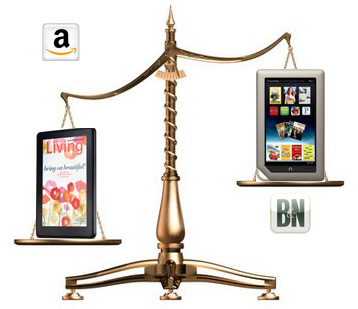Barnes & Noble unveiled their new Nook Tablet today, boasting higher specs than Amazon’s Kindle Fire in nearly every measure, including price. The new Nook weighs in at $249 versus $199 for Amazon’s tablet. Barnes & Noble also announced immediate price cuts of the current Nook Color to $199 and the Nook Simple Touch to $99.
Clearly, these moves are in response to Amazon which makes the higher price of the new Nook rather puzzling. Even more puzzling given that anyone who’s been watching the iPad vs. everyone else tablet wars has already seen this movie played out before. Barnes & Noble calls the new Nook a better value than the Kindle Fire because it has a faster CPU, more system memory and data storage. And they’re right, in a rationale world, the higher spec’d, better performing tablet should command a higher price. Consumers should flock to it, right?
But isn’t that what a number of tablet makers claimed when they went into battle against Apple’s iPad? They offered tablets with more features, raw processor speed , and memory than the iPad. And some of them could play Flash videos and games too which the iPad still cannot do. This greater performance came at a greater price than the base iPad which was entirely reasonable being a better value. But in the end, most of these tablets were utter market disasters. Even the most successful of them have scarcely made a dent in the market share of Apple’s iPad.
Consumers are looking for value, but that doesn’t always correspond to the better hardware. Amazon has an enormous media and online retail data infrastructure to plug the Kindle Fire into. This is entirely analogous to the integrated ecosystem that Apple has built around iOS devices. When you buy an iPad, buying movies, music, and apps is drop dead easy. If Amazon produces a similar user experience with the Fire, the higher spec’d Nook won’t even get a chance to play. Sometimes less is more.
It is good that Barnes & Noble seems to have gained an ally in Netflix, but launching a new tablet at $50 more than the latest from the Amazon juggernaut could be a fatal mistake. Techies love the faster hardware, but they are not the market that is at stake here, nor are the people happily using iPads and other full function tablets. The real market consists of that larger, aging population of people who are increasingly annoyed that so many physical bookstores are disappearing.
These book lovers are being forced by necessity into buying their first eReaders. Little do they know just how quickly they’ll be hooked on eBooks. Once that happens, they’ll be well primed to buy other digital content. This crowd is not going to go for the tablet that costs $50 more than the one from the company that they’ve probably ordered books from in the past. I mean, really, who hasn’t bought something from Amazon in the last 10 years?
I think, B&N can build some advantages with their physical stores and the ability to not only showcase the Nook, but also popular and up and coming authors. But they’ve seriously got to lose the $50 premium. Price matching the Fire with the slower, older Nook Color is not going to cut it either. I think this fall is setting the stage for whether the last major U.S. bookstore chain survives or closes the book on the era of popular printed literature.
